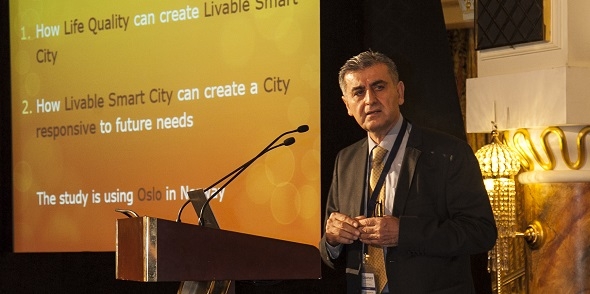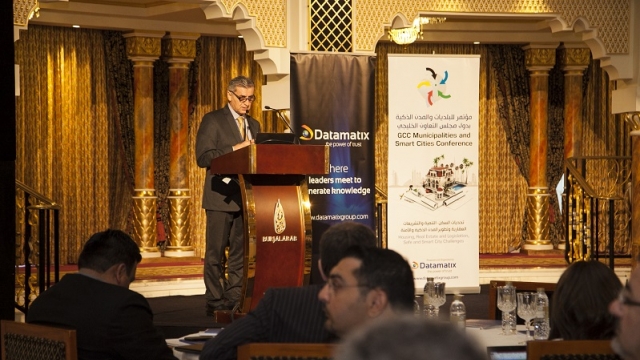October 23rd, 2014: Dr. Hoshiar Nooraddin, a professor in the School of Architecture and Interior Design at Canadian University Dubai, has addressed a gathering of municipal government officials from across the GCC to reveal the key ingredients for a livable Smart City.
An architect by trade, Dr. Nooraddin developed expertise in the Smart Cities initiative through research and professional practice during his time in Norway. As a specialist in the region, he was called upon to deliver the keynote address at the 4th annual GCC Municipalities and Smart Cities Conference held at the Burj Al Arab, Dubai.
The two-day symposium was attended by leaders and senior decision makers from several GCC government municipalities, and examined topics such as modern management, IT and e-Government, customer care services, education, and knowledge management.Dr. Nooraddin was at the head of the conference agenda, which saw an elite group of experts from the public and private sectors share their insights into international best practices in the field.
The Smart Cities initiative has become a priority for municipalities across the region in recent years. Dubai, under the direction of His Highness Sheikh Mohammed bin Rashid Al Maktoum, Vice-President and Prime Minister of the UAE and Ruler of Dubai, has developed a raft of strategic projects to transform the Emirate into one of the world's most connected and sustainable Smart Cities for the inception Expo 2020.
Introducing the notion of 'livable' Smart Cities, Dr. Nooraddin said, "The challenge for any city in this process is to work in parallel with innovations in technology to consider the social and human aspects of development.
"Smart Cities need to take account of lifestyle and environmental considerations to achieve sustainable growth. A livable Smart City is one that embeds quality of life in its evolution."
Dr. Nooraddin shared lessons from the Norwegian city of Oslo, which was recognized by the European Union as an exemplar in the 2013 Smartest City Rankings. He revealed the eight strategic objectives implemented by the city to provide a good quality of life while delivering its Smart City objectives.
Among the key strategies, Dr. Nooraddin highlighted the importance of integrating the national culture of a country into the design of buildings and urban space, the need to focus on climate-friendly initiatives, and to develop a city oriented towards the use of public transportation.
He also stressed the importance of 'smart continuous community participation', saying, "Smart Cities must integrate knowledge of the initiative into education, support continuous media involvement, and promote active community participation in all Smart City related projects."
He concluded that there is no ideal, prescribed model for a Smart City. "Each city needs to establish its own agenda and create sustainable strategies to ensure it is responsive to future changes" he said.



